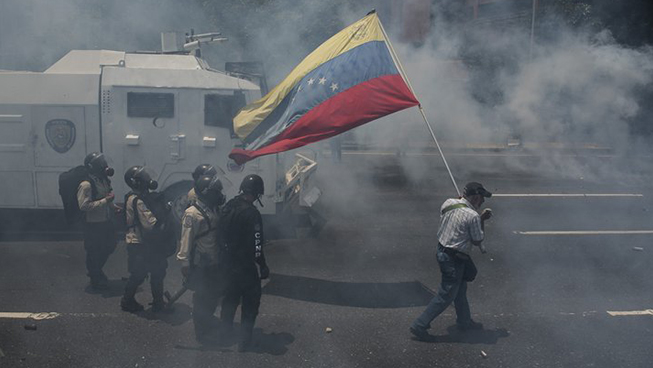
By Mark Weisbrot
The OAS intervention is difficult to see as anything other than a partisan, Washington-driven initiative.
Venezuela’s announcement that it would withdraw from the Organization of American States (OAS) has been greeted with the usual derision in the U.S. media, most of which long ago abandoned any pretense of journalistic neutrality on that country.
But if we step back a bit from the major media narrative, there is a logic to Venezuela’s decision. The OAS, especially under its current secretary general, Luis Almagro, is not the multilateral body that it pretends to be. Almagro, with backing from the U.S., has been on a jihad against Venezuela for years now. In 2015, he spent months trying to delegitimize the Venezuelan National Assembly elections, claiming that they would be stolen without “help” from OAS observers.
His behavior was so out-of-bounds and repugnant that José Pepe Mujica, ex-president of Uruguay, denounced Almagro, his former foreign minister. “I regret the line you have taken and I know it’s irreversible, so now I formally say goodbye,” wrote Mujica, who is widely loved and respected in South America for his honesty and integrity. Almagro turned out to be completely wrong, as the Venezuelan elections were conducted without problems, with the opposition winning 56 percent of the vote.
So, from any objective viewpoint ― regardless of what one may think of either side of the conflict in Venezuela ― the OAS intervention is difficult to see as anything other than a partisan, Washington-driven initiative. In fact, this would never have happened a few years ago, when most South American governments had an independent foreign policy. But now Brazil, Argentina, and Peru have right-wing governments that are strongly aligned with Washington.
In 2013, when the Venezuelan opposition launched violent protests to reverse the result of a democratic presidential election in Venezuela, the then secretary general of the OAS, José Miguel Insulza, joined the U.S. government and the right-wing government of Spain as the only diplomatic actors in the world who would not recognize the results ― despite there being absolutely no basis for opposition claims of fraud. But Spain and Insulza had to back down under pressure from South America, and then secretary of state John Kerry subsequently gave in.
The U.S. has successfully manipulated the OAS numerous times to get rid of governments that it did not like. Recent examples include Haiti in 2011, when an OAS commission illegitimately reversed the results of the first round of Haiti’s presidential elections; and the coup in Haiti in 2004, which was the culmination of a four-year effort by the U.S. and its allies ― with help from the OAS ― to topple the democratically elected government there. The U.S./OAS role in the destruction of Haitian democracy has passed mostly without notice because most Haitians are poor and black.
Latin American governments put up a fight over Honduras in 2009, when the U.S. was trying to legitimize the government that came to power there in a military coup. But in the end, Washington was able to block the OAS from taking the position that the majority wanted: that the OAS should not recognize the post-coup elections until the democratically elected president, Mel Zelaya, was returned to office. Hillary Clinton (then secretary of state) admitted that she successfully blocked Zelaya’s return, in her 2014 book, “Hard Choices.”
Washington’s manipulation of the OAS in 2009, in support of the coup government in Honduras, moved the rest of the hemisphere to create a new organization that excluded the U.S. and Canada.
But the worst part about the current Trump/OAS effort to delegitimize the government of Venezuela is that it appears to be geared toward extralegal regime change. This is a standard playbook ― delegitimation followed by overthrow ― and it encourages violence where negotiations are necessary. This is especially true with an opposition that since the U.S.-supported military coup of 2002 has been divided on whether to use peaceful or violent tactics. People who say that these are efforts to put constructive “pressure” on the Venezuelan government are delusional or dishonest — especially when the pressure comes from an OAS that is so openly partisan and dominated by Washington, and therefore lacks legitimacy of its own.
Venezuela needs a negotiated solution because it is still a polarized society. Despite 400 percent inflation, widespread shortages of food, and a 17 percent decline in GDP last year, President Maduro still has an approval rating of 24 percent, according to the most reliable antigovernment pollster (Datanalisis). For comparison, that is better than the presidents of Brazil (10 percent), Colombia (16 percent), and Mexico (15 percent). There is a base of Venezuelans that support the governing party and fear what might happen if the opposition seizes power; and it includes the military.
Violent regime change often has unforeseen and terrible consequences ― we can see what happened when the U.S. pursued this strategy in Iraq, Syria, Libya, Haiti, and elsewhere. Venezuela needs change ― both economic and political ― but it must come about peacefully, through dialogue, negotiations, and elections. The U.S. strategy of manipulating the OAS for political purposes will make this much more difficult, and it encourages more political violence in Venezuela.
The current president of the Dominican Republic, Danilo Medina, recently asked for an apology from the OAS for approving the U.S. invasion of his country in 1965. Some things never change.
Mark Weisbrot is Co-Director of the Center for Economic and Policy Research in Washington, D.C., and the president of Just Foreign Policy. He is also the author of “Failed: What the ‘Experts’ Got Wrong About the Global Economy” (2015, Oxford University Press).














